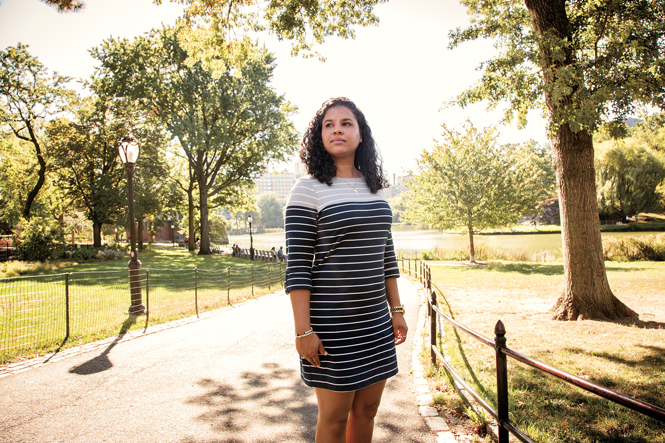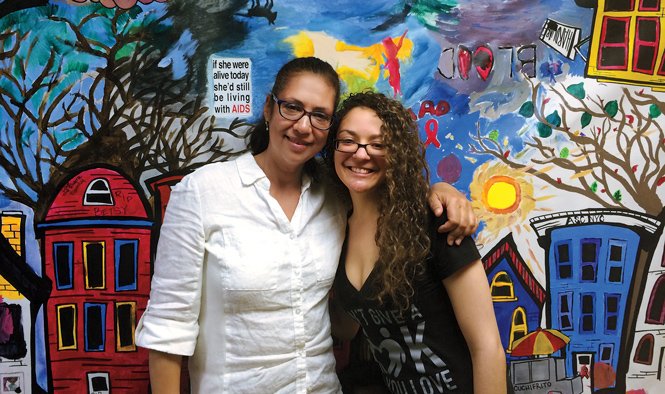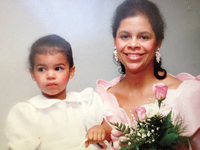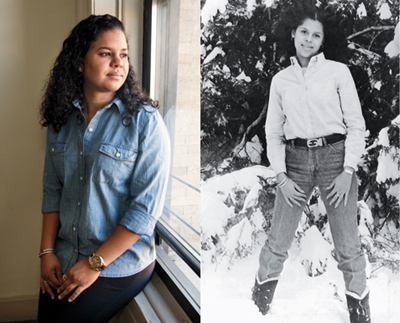By Tracy Jarrett ’11
Julie Keith Jarrett ’81 died from AIDS in 1994. To imagine the person her mother might have become, Tracy Jarrett ’11 traveled from East Harlem to Cape Town to Chicago.
I remember the day my mom died. The night before, we’d fallen asleep together in her room. I was wrapped up tight in my Princess Jasmine sleeping bag at the foot of her bed as she slept delicately next to my grandmother.
I woke up the next morning in a panic on the floor of my own bedroom, still zipped in my sleeping bag, while my dad slept on my bottom bunk. When I got up and ran for the door my dad suddenly awoke. He tried to stop me, but before he could say a word, I’d already run down the hallway into my parents’ room. Mom wasn’t there. I stared at her empty bed for what seemed like forever.
No one had to say a word. I knew she was gone.
It is now 20 years since I stood in the doorway of my parents’ bedroom not understanding why my 35-year-old mother, Julie Keith Jarrett ’81, had just died from AIDS.

Photograph by Beth Perkins
Even now, at 25, I can’t say that I fully understand why she died or why my father and I are HIV-free, but I can say that I am learning to answer questions about the life my mother might have lived had she been diagnosed at a time when HIV wasn’t a death sentence.
Many of these answers came in 2012 when I set out on a reporting journey for GlobalPost across two continents to document the lives of women, in particular mothers, living with HIV. The strength and courage illuminated in their daily lives made me proud of who I imagined my mom would have been. Having HIV wouldn’t have meant a life of unhappiness, but instead a life helping and caring for others—including me.
In my hometown of Chicago I interviewed my family about what it was like to learn my mom was HIV-positive and to take care of her, knowing people would judge her and that she would die. In New York I met with a mother and daughter who were educating women in their East Harlem community about how to live healthily with HIV. Susan and Christina Rodriguez’s quest was motivated by their personal experiences: both women were infected with the virus. Halfway around the globe, in Cape Town, South Africa, I spent time with another HIV-positive mother, Nozi Samela, who was dedicating her life to mentoring other mothers with the virus and helping them learn to take care of themselves and their newborn babies.
Two years later, in spring 2014, I caught up with these courageous women.
Cape Town
“I’m sorry to say that you have missed a lot,” Nozi said, laughing, when she picked up the phone this May. Hearing her familiar voice took me back to South Africa, where we’d met for the first time; I still remember the salmon-colored coat she wore that day, her smile, her bubbly laugh.
In July 2012 Nozi had been new to her job as a communications associate for mothers2mothers, an international nonprofit that trains HIV-positive mothers to help other HIV-positive women who are pregnant. It also sets up mentorship programs aimed at preventing mother-to-child transmission of the virus. Nozi had just found out she was pregnant with her second child. At the time, I never would have known that Nozi was living with HIV. She looked happy and healthy; she was glowing, and she was thriving in her career. But that was not always the case. Eight years earlier, she’d told me, she was 19, six months pregnant with her first child and recently diagnosed with HIV. She was living at home, taking care of her siblings and cousins, unable to attend university because her aunt had spent the money Nozi had saved for enrollment. She felt scared, stuck and unsure of her future.
With the help of m2m, Nozi changed her life. She gave birth to a healthy baby boy and became one of the program’s mentors, sharing life-saving knowledge, such has when and how to breastfeed, how to take HIV medication, how to talk to your spouse about family planning and how to eat healthily. But then she suffered the worst loss imaginable: In 2007 her toddler son was killed in a car accident. “I hated the organization,” Nozi told me in 2012, as she looked back on her son’s death and her role as an m2m mentor mother. “It was called mothers2mothers, and I was no longer a mother.”
Over time Nozi redefined what being a mother meant to her. She didn’t leave m2m. In fact, she became more involved. “Mothers2mothers is not just about helping women accept their HIV status, or about helping women give birth to HIV-negative children; it is helping women go on with their lives,” she said in 2012. “It is helping women understand that being HIV-positive is not the end of life, but actually a beginning of a new chapter.”
Today, Nozi has a 2-year-old daughter, Mbali.
“All over again things have changed for me,” Nozi says now. This time, she says, motherhood is not simply about loving her new baby but about learning to be a mother again, about discovering Mbali’s personality and how it differs from that of her son.
Nozi had a complicated delivery with Mbali that left the mother with no feeling in her body, for reasons doctors could not diagnose. The numbness made nursing impossible. As doctors tried to figure out what might have gone wrong, Nozi was hospitalized and Mbali put in the hands of nurses. Nozi was concerned, with good reason. Formula is against the World Health Organization’s instructions for HIV-positive mothers, because when combined with breastfeeding, it can increase the risk of transmitting the virus.
Eventually, Nozi recovered and decided to breastfeed. Little Mbali, meanwhile, needed to be tested. “I will be honest with you: I was scared. I was terrified,” Nozi says of taking Mbali to the clinic. “I knew that I had taken my treatment; I knew I had done everything right, but then I still knew that even if the mother takes antiretroviral drugs and does everything right there is still a 2 percent chance her baby could be infected.”
The test took a week to process. “The day I went to [the] clinic to fetch the results I didn’t hear anything the counselor said to me. I was praying that if anything could change now, let it be changed. I knew if she was HIV-positive nothing could change at that moment, but I was praying for [a] miracle.”
Mbali’s test came back negative. “For a moment I was confused about what ‘negative’ and ‘positive’ meant—mind you, I am someone who has been working with HIV for over six years, but in that moment I was so confused the nurse had to explain it to me,” Nozi remembers. “I was so happy to learn my baby was HIV-negative. Even though I knew there would still be a small chance for her to contract HIV through the course of breastfeeding, in that moment I was so happy.” Nozi was determined to follow the WHO guidelines to exclusively breastfeed Mbali. These guidelines are based on research showing that a combination of exclusive breastfeeding and antiretroviral treatment significantly reduces the risk of transmitting the virus from mother to child.
With the help of m2m, which made sure she received pre- and postnatal care specifically tailored to HIV-positive mothers, Nozi protected both of her children from contracting the virus.
M2m’s efforts to prevent mother-to-child transmission “are paying off,” says the organization’s co-founder and international director Robin Smalley, “but there are some countries where there’s a long way to go,” such as Mozambique and Botswana, two of South Africa’s neighbors. Under the leadership of CEO Frank Beadle de Palomo, m2m has expanded its services to address more general maternal and newborn health issues in sub-Saharan Africa.
“Our mothers are now being trained to do TB testing, to give referrals for cervical-cancer screening, to raise awareness about malaria prevention and to determine malnutrition,” Smalley says. M2m is also working with the governments of Malawi and Uganda, where HIV is virulent and access to health care limited, on programs that would provide one-stop testing and support for women, so that they do not have to go to multiple clinics for different services.
Nozi hopes to use the coming years to travel abroad as an ambassador for m2m. The World Health Organization estimates that 3.4 million children are living with HIV, the majority of them in sub-Saharan Africa. Most acquired HIV from their mothers, but with interventions such as antiretroviral therapy, the risk of mother-to-child transmission can be reduced to 2 percent. “I may have saved my daughter from HIV, and other women have saved their children, but there are so many women giving birth to HIV-positive children,” Nozi says. “I feel that I still have a role to play in advocating for mothers living with HIV in the entire universe.”
East Harlem
A few days after I called Nozi, I went to East Harlem, N.Y., to visit Christina Rodriguez and her mother, Susan. It was my first time visiting their office in a local community center. I walked up the stairs to Susan’s office, where Christina greeted me with a warm hug. Susan got up from behind her desk and hugged me as well. I felt like I was home.
When I first met Christina two years ago, I couldn’t help but compare our stories. We are roughly the same age. She was 5 when her dad died; I was 5 when my mom died. Susan had contracted HIV from Christina’s dad; my dad did not contract HIV from my mom. Christina was HIV-positive; I was not. We were opposite sides of the same coin. Susan, like Nozi, helped me envision the life my mother might have had if she’d lived. Christina was the only one I knew who could show me what my life might have been had I been born positive.

Susan and Christina Rodriguez are the mother-daughter team behind SMART, a group run by and for HIV-positive women to encourage healthy living. Photo Courtesy of Tracy Jarrett
Christina was the only one of her parents’ three children to contract the virus. Her HIV-positive status propelled her to help kids in the same situation, and she and her siblings founded a youth program under SMART, the community-based group that Susan had founded in 1998. SMART University (Sisterhood Mobilized for AIDS/HIV Research and Treatment) is an educational organization run by and for HIV-positive women to teach about and encourage healthy living.
When I first met Susan and Christina, SMART served fewer than 500 people and struggled to find consistent funding. Since then, the organization has expanded, moving to a more central location in East Harlem. While funding is still a struggle, SMART now helps close to 750 people. In 2013 the organization was selected by community vote to receive $180,000 in capital funding for a mobile cooking classroom and emergency response center. “This district has one of highest rates of obesity, poverty, asthma and cardiovascular disease in the state,” Susan says. “It’s really important that we bring what we know to the community in terms of healthy eating and cooking.”
SMART has also been working with the Harlem Community & Academic Partnership to become “research-ready,” a technical designation that would allow SMART to collect data on their own programs to assess and then publicize the impact they are having. “Government and academic institutions have their own criteria for assessing effectiveness of programs, so a lot of community-based organizations get left out when talking about effecting change,” says Janet Carter, SMART’s program director. “Becoming research-ready is about bringing us and what we do to the table.” Susan gave a presentation on SMART’s journey to becoming research-ready at the July 2014 International AIDS Conference in Australia, and Christina went with her.
Christina hopes to graduate from college next semester and has a long-term boyfriend. Susan is helping another daughter raise two young boys and is supporting Christina’s younger brother as he finishes college. Despite these competing interests and obligations, neither Christina nor Susan will rest until SMART makes a visible and lasting difference in the lives of those in their community.
“When she talks about this mobile kitchen project, this is when she’s shining and glowing,” Christina says of her mother. “This project, that’s her drive right now.”
“I hit the jackpot with my kids,” Susan says. “I’m continually amazed at what all three of my children do.”
I was amazed by Christina, too. Before meeting her, I’d avoided thinking deeply about what my life would be like had I contracted the virus—I wouldn’t have much of a life, I thought. But Christina, with her curly locks that closely resemble my own, proved to me that an HIV-positive life is one worth living, and that, in fact, your HIV status is not the most interesting or defining thing about you. Here we are—Christina with HIV, me without—and as we navigate our 20s, we both butt heads with our parents when they tell us what to do; we both experience happiness and heartbreak in relationships; we’re both driven by a passion for improving the lives of people with HIV. I thank Christina for showing me what my own life might be like had I contracted HIV. This is something I didn’t expect to find on the journey to understanding who my mom might have become.
My family’s story
I promised Susan, Christina and Nozi that I would keep in touch. Each time I hear their stories, the gaping hole that opened up as I stood staring at my mother’s empty bed is filled up a bit—made a little smaller by their love for life, their love for their families and the pieces of their lives that they have shared with me.

Photo Courtesy of Tracy Jarrett
My mom never told anyone how she thought she may have contracted the virus. My grandmother has come to believe that my mom got it from a man whom she was dating in her early-to-mid-20s. He died from AIDS a few years before my mom did. My dad believes she got it before that, maybe from someone in college. But because my mom did not fit among any of the “four H’s”—hemophiliacs, heroin addicts, homosexuals or Haitians, a rule of thumb doctors used in the early ’90s to pinpoint people at risk for HIV—she went untreated for nearly 10 years.
Perhaps because I look uncannily like my mom, or perhaps because they hold on to her through me, my dad and grandma often unwittingly call me “Julie.” Every time I hear her name, I am reminded of her accomplishments—Amherst graduate, successful businesswoman, mayoral aide and mom. She taught me how to pump my legs on the big kid swing, how to chew on the side of my mouth when I had a loose tooth and how to never lose my faith.
After my mom died, my family never mentioned her disease, at least not to me—it was a secret. My grandma says this is because no one wanted me to lose friends, to be gossiped about, to be ostracized. If people knew you were around someone who was HIV-positive, they would not want to touch you, come to your house or eat off your silverware.

Left: Tracy Jarrett; Photo by Beth Perkins
Right: Amherst yearbook photo of Julie Keith Jarrett
However, my mom did not hide her diagnosis. She looked sick; she had lost weight and her hair. People sometimes advised her to claim to have another disease, such as cancer, but she wouldn’t. Aside from me, our whole family knew about her HIV, and so did close friends. But no one ever talked about it. My grandma says there were no feelings to talk about, because they all knew what happened to AIDS patients: they died.
Today my grandma knows that times have changed, but she remains nervous when talking about my mom and HIV. She worries that, in sharing my own story, I will brand myself in a negative way. When I was reporting for GlobalPost in South Africa in 2012, my grandma was proud—she saved every article I wrote and said she was inspired by my speaking out. Still, whenever I tell her that I am writing another story, she asks the same two questions: Is NBC—my full-time employer—OK with me yet again covering HIV for GlobalPost? And am I sure I don’t want to write about something else, so that I don’t pigeonhole myself as the girl who writes only about AIDS?
I always answer “yes” to both questions, and whenever I visit Chicago, I find my newest article printed out in my grandmother’s room. She’s coming around to the fact that my interest in writing about AIDS is not merely a phase. My reporting on women and families affected by HIV is something I will carry with me throughout my career. I want to give HIV-positive people the chance to tell their stories, and to make sure they are not ostracized or forgotten. It is important for me to tell the story that my mother cannot tell for herself.
Tracy Jarrett ’11 is an award-winning reporter and writer for NBC News. Her work has appeared on Dateline NBC, Nightly News with Brian Williams, Today and nbcnews.com. Her reporting on HIV in South Africa was made possible by a Kaiser Family Foundation/GlobalPost reporting fellowship. An earlier version of this article appeared on GlobalPost.